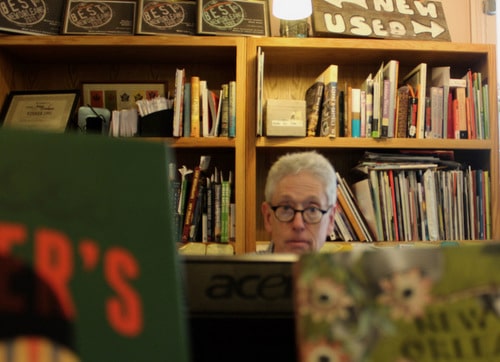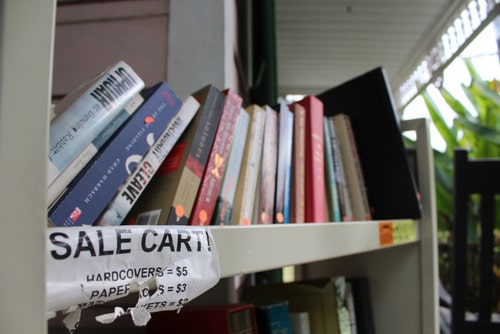
Gladin Scott looks up behind a pile of books on Oct. 24, 2016. Behind him are sticky notes with numbers of frequent customers and authors that he has compiled from his years as owner. (Photo by Dannielle Garcia, Loyola Student News Service).
By Dannielle Garcia, Loyola Student News Service
On utility poles throughout the university area, stapled sheets of paper plead to “Help Save Maple Street Book Shop!”, the book store that has been operating there since 1964 and, yet again, faces an uncertain future.
The only thing that differentiates the store from another house on the block is the green sign in front, partially blending into the bushes, that reads “Maple Street Book Shop” and the sale cart of books on the porch.
Since its inception, the book shop was passed down to three different owners before it landed in the hands of Gladin Scott, its current caretaker. Before he became the sole owner of the shop in 2013, Scott was a loyal customer from when he was 17.
Last year Scott announced he was closing the bookshop after 51 years in business. But the response from the community was so supportive, business nearly doubled. He stayed open with steady business and renewed hopes until this year, when business declined again to even lower levels than the previous year.
According to Pew Research Center, the number of book readers has been on a decline since 2011 while the number of e-book and audio books have been on the rise. While writers may not be in trouble yet, book shops — especially the independent ones like Maple Street Book Shop — are.
“Places like Amazon have run me into the ground,” said Scott, unpacking a new shipment of books from a small box.
English professors from neighboring Tulane University and Loyola University New Orleans tried to support the business by ordering books through the shop for the students to pick up, Scott said. But over the years fewer students bought books from Scott because ordering online did not require them to leave their rooms. What could have once added to his profit, ended up costing him more because he had to send back the unsold books. So he had to start denying orders.
“Certainly the store reflects my interests in literary fiction, but we buy with our customers in mind,” said Scott, as he placed a few children’s books on a cart.
The front of the shop has shelves with single copies of crisp books, including a book shelf with a piece of paper taped to it saying “Gladis’ Book Club.” Behind him stood tall book shelves filled with custom-ordered books and sticky notes with scribbled numbers belonging to longtime customers and authors. On top of the shelves are awards from Gambit Weekly for “Best Local Book Store.”
Most of the books in the store are used. Scott said they haven’t been ordering stock since business has been so slow and he cannot afford to preorder books that won’t sell. He usually gets books that he thinks his customers will be interested in and known authors that sell well.
On a recent afternoon, a gentleman wearing a baseball cap and a button down pushed his walker to the check-out desk.
“That will be $9, Don,” Scott said as the customer of 50 years slowly pulled the cash from his front pocket.
After the exchange, Scott held the door then walked the man out of the shop and down the steps. He returned inside to behind the desk and started typing on the computer, then realized the customer’s book was still on the desk.
“Darn it, he left his book here,” he says as he runs out after him.
Scott has a lot of “special needs” customers as he calls them – elderly customers of the long-standing bookshop that call in the mornings to order a book because they don’t feel comfortable with the Internet.
A few months ago, when a part-time employee was working, the shop got robbed. The thief put a knife to the worker’s neck and demanded the contents of the cash register. He left with $50.
Scott said he works six days a week, though the shop has two other part-time employees who come in on Saturday. “That means I could take the day off, but I usually don’t,” said Scott with a faint laugh.
Scott is 66. He said he put a lot of savings into saving the shop last year. “I’ll probably close it at the end of the year,” he said, letting out a sigh as he threw away some trash by the check-out desk.

At Maple Street Book Shop, the used books that are on the shelves for too long go on the sale cart on the porch. The books sell for $2, $3 or $5. (photo by Dannielle Garcia).
The Loyola Student News Service features reporters from advanced-level journalism classes at Loyola University New Orleans, directed by faculty advisers.
I hate to see this happen. My grandfather operated a bookstore in the Quarter from 1964-71 & his stories were great. I inherited my love of reading from him & even though I am a technology professional, there is just something magical about holding a book to read. I can’t imagine my mother putting me to sleep as a child while reading from a tablet or iPad. We need to support local bookstores or we’ll be telling future generations about bookstores the same way we’ll have to about corded landline phones.